Snow, ice and sleet – not to mention the chemicals used to melt them – can wreak havoc on your vehicle. Properly thawing your car when winter delivers its worst is important to prevent long-lasting damage and keep you safe while driving.
How to defrost car windows effectively and efficiently
Start with a properly operating heater. If the engine is not getting up to the proper operating temperature, the defroster will be much less effective. Set the climate control to full defrost rather than bi-level. This will direct the maximum airflow at the windshield.
If your car has the option, the defroster should be on the fresh air setting rather than re-circulated air.
Get tips on how to defog your car windows here.
How can you remove snow without damaging your car?
Use a long-handle snow brush or snow broom (sometimes called a snow rake). Clean from the middle and push or pull the snow. Doing this before the snow turns into ice will prevent damaging the paint.
Clean the entire car – hood, roof, lights and license plates.
How does salt damage your car and how can you prevent it from happening?
Salt (sodium chloride) and other road chemicals (magnesium, calcium chloride and other brines) can cause accelerated rusting.
To prevent this, you should clean any accumulated salt off your vehicle as soon as practical. Flushing with clean, fresh water is ideal. During winter, an occasional undercarriage wash will help wash away any built-up salt, sand or other road deicing chemicals.
If your car is covered with sticky brine, salt or other chemical substances, don’t park the car in the garage. The warmer air will speed up the corrosion process. Wash and dry the car before putting it in a garage. Touch up any paint damage or scratches before it starts to rust.
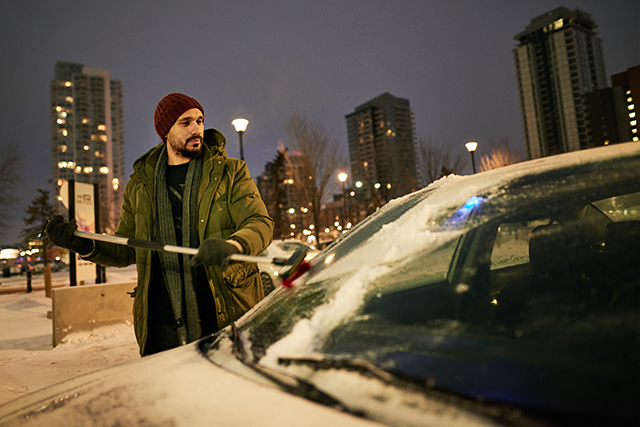
What’s the best way to remove ice from the car?
If you are able to open the door and get in, do so and start the car. This will allow the vehicle to warm up and begin to melt the ice.
Do not use sharp products – and never use a shovel. A strong plastic ice scraper will do just fine. Another option, once the car starts to heat up and lightly thaw, is banging on the ice with the snow broom to loosen the ice. You can also use an aerosol deicer spray on the glass but be aware this is mostly alcohol and may remove wax from the paint.
If the car door is frozen shut, what should you do?
Never pour hot water on the door. Although this may get you into the car, you have just added more water that will likely freeze again.
First, make sure to try all the doors. If it’s an SUV, even try the hatch. You may find one door that you can get in. Don’t yank on the door handles as they can break. Try banging your hand along the edge of the door, which may free up the ice. You can also spray deicer on the door and handle. Or just wait until the sun comes out if that’s an option.
Once you get the door open, wipe down all the rubber gaskets to remove any moisture and then spray the gaskets with silicone. This will displace any moisture and prevent door freezing. You should ideally do this a couple of times per year.
Share your tips on how to defrost car windows in the comments below.
This article has been updated and republished from a previous version.
50 Thoughts on “How to Defrost Car Windows and Other Winter Conundrums”
Leave A Comment
Comments are subject to moderation and may or may not be published at the editor’s discretion. Only comments that are relevant to the article and add value to the Your AAA community will be considered. Comments may be edited for clarity and length.



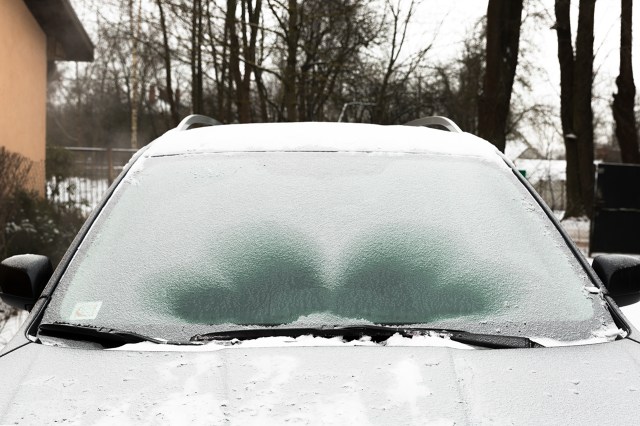

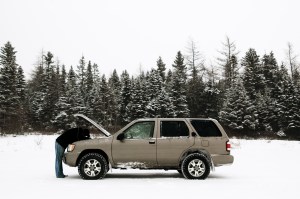

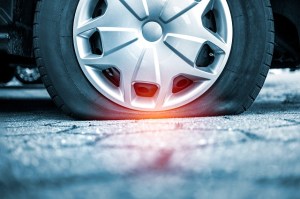



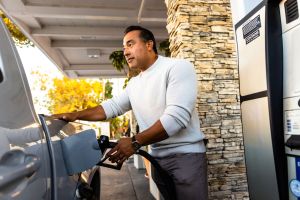
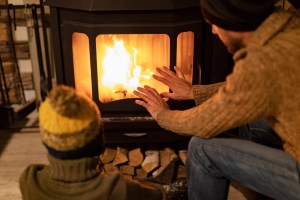

Just want to disagree with those people that recommend lifting your wipers prior to storm! I did it and when I placed my wipers down, the motor snapped inside and wiper was totally disabled. Went back to dealer for repair and he said never ever raise your wipers as they can freeze in that position and break the mechanism. I had an awful time navigating home in the storm!
I would like to add to your comment about the wipers.
I had my wipers up so they would not freeze to the windshield and when I came out to my car the wind actually blew the wiper down and it made a crack in the windshield!
So putting my wipers up in the winter is something I learned NEVER to do!
For a keyed door lock, an automotive lock deicer works great. They come in little spray bottles with a flat nozzle that fits directly into the lock. You can buy one on Amazon. Even modern cars with key fobs have keyholes for emergency use. This is not likely to be your problem, but if it is, this is a great way to deal with it.
Agree with dont pour very hot or boiling water on ice covered glass… temp contrast might crack the glass. But, warm, room temp or a couple degrees above freezing, will melt black ice, which is hard to chip off. For frozen latches and door locks, an old fashioned shop worklight with incandescent bulb or halogen bulb that generates heat, Not the new LED ones that are safe to touch, clear away any snow, hold the front against the metal of the latch or lock and it will warm it and defrost the ice underneath.
If time permits ahead of a storm, put a spare blanket over front and back windshield glass to form a barrier. Snow Peels off by lifting yhe blanket and pulling tot the side when storm is done.
Silicone spray has been mentioned many time… Is everyone referring to the spray WD40 or what is meant by silicone spray?
Hi Carol, silicone spray is a water-resistant lubricant. Traditional WD40 is not silicone based, but they do sell one that is: https://amzn.to/3u4lGmG. Thank you for reading!
I disagree with the suggestion to set the defroster to fresh air rather than recirculate. Fresh air is most likely quite cold. You are likely to get faster results recirculating the already heated air in the car. This would be especially true for cars with marginal heater systems or electric cars in general.
I have used a blow dryer on low heat to defrost my car doors. Works like a charm! Gotta love Northeast winters!
If you still use keys to open your car door, heat them with a match. Do NOT get your car washed if it doesn’t have time to dry completely BEFORE the temperature drops below 32 Degrees
Three preparations I take when a freeze-up is forecast: 1: Spray the drivers side door gasket and latch with silicone so I can readily get in and start the car and turn on defrosters; raise the windshield wipers if possible, otherwise place wax paper between the blade and windshield to free-up the blades to help in clearing windshields; ; keep a couple of surplus spray bottles filled with car antifreeze to liberally spray on key frozen areas.
Didn’t see this mentioned here. Raise your wiper blades up off the windshield before the storm. This not only makes it easier to clear the snow and ice off of the windshield but also prevents a broken wiper blade assembly or burnt out wiper motor. Some vehicles require you to activate the wipers to bring them up from under the hood. Instructions for this should be in your cars manual (that’s the encyclopedia sized book shoved in your glove box).
You state “If your car has the option, the defroster should be on the fresh air setting rather than re-circulated air”‘ how can this work if the air intakes are frozen over?
Hi Robert, thanks for the question. Here’s a response from our Car Doctor John Paul: In most cases the defroster switches to fresh air when selected. Yes if the car is totally encrusted in ice and snow fresh air will be limited until the snow is clear- but then again you wouldn’t be driving a car covered in ice and snow.
To defrost your windshield quickly, use the full defrost option rather than heat and defrost. Lower both windshield visors all the way down; this will aim warm air directly up the windshield. It really works!
Isn’t there a risk to having the windshield crack? That is, when the glass is too cold, and then you put heat on. I had it happen once, and that’s what the glass repairman told me. He said not to put the defroster on immediately. Let the inside of the car warm up a bit first.
I’m in my 70s and have never had any windshield cracking when putting the defroster on high plus my rear windshield defroster on high. I go to the ice-covered car about 15 minutes before I need to drive, put the defrosters on high and put on recirculating inside air that warms the car quickly. I just did it yesterday here in Maine and it worked like a charm, as always.
Here’s a tip for lessening the chance of your doors icing up after a car wash on a cold winter’s day:
As soon as the car exits the wash bay (and if someone is there to dry off windows and some of the exterior) I pull over, open all the doors, but then only shut them until the lock (partly) engages – not shut tight, but it won’t open when pulled on.
I then drive with the heater blasting max temperature, max blowing for a little bit – to force hot air out of the spaces between the partially-shut doors and the body of the car – to dry those areas.
After a while I get out and push all the doors fully shut.
To prevent freezing after a car wash, open the doors and hatch and wipe the door edges and door frames with a towel. Not only does this prevent freezing, it may remove any dirt that was missed by the car wash workers. It takes minutes to finish the door areas and prevents freezing. Your personal touch !
I use a very large tarp and a couple bungee cords and cover my car! After the storm, pull it off car. Ice and snow slide right off, car is totally clean. Just fold tarp and put away!
I have a remote started the best investment we ever made …..
On the new cars today we have the Fob, so it is not necessary to use a key to unlock the door. But years ago, when we used the key to unlock the door and the lock was frozen, we would heat the end of the key with a cigarette lighter just so it was warm enough to melt the ice and when you slowly put the key in the keyhole of the door the ice would melt.
Ha! I remember those days!
I remember heating a key too. I stopped using that method when the key broke off in the lock!
Measure the dimensions of your roof, including windshield, side windows, and driver’s door lock (not rear window). Next, buy a tarp matching those dimensions and four bungee cords that have the length to allow you to attach to wheel /fender wells. As long as you keep UR car relatively clean, pulling the tarp off won’t scratch the car. Loosen two of the cords and remove the snow to the halfway point of the vehicle. Then grab the tarp itself and pull the rest of the way; snow-free windows, windshield, and no frozen door lock.
If you don’t have a garage, would a suitable car cover work for keeping snow and ice off your car?
Hi, thanks for the question. Here’s an answer from our Car Doctor John Paul: It would work, but depending on how much snow and ice there is, it’s way too much work in my opinion. Car covers are somewhat absorbent and the idea of trying to roll up a snow or ice encrusted car cover would be pretty impractical and would also likely tear the cover. A better option might be a remote car starter. At least you could preheat the car and make snow and ice removal easier. Depending on the car cover and the car, the prices could be similar. The last car cover I purchased was $300.
I learned a weird hack for the windshield/windows…spray them with red vinegar before the snow arrives. The snow comes off much easier…but it is still very important to clean off your car before anything freezes. I have not left it long enough to know if it makes a huge difference in the ease of removal. *DO NOT use this method on your mirrors. I tried it on the outside mirror and ruined it (not sure why).
Twice a year spray WD-40 on all your Door and hatch/trunk latches and all hinge joints. Then spray some WD-40 on a rag and wipe all your door seals/gaskets. Works all the time. The spraying of the door and hatch/trunk pivot points keeps them working smoothly year round and prevents premature failure.
I would never use WD40 on gaskets and seals. Too oily. I use it as you do, but I use silicone on gaskets.
What about how to prevent frost from forming on the inside of the windows?
Hi Erin, here’s an answer from our Car Doctor, John Paul: The frost is caused be excessive moisture in the car. This could be due to a leak (windshield or door) or even just tracking snow into the car and letting it melt. The first place to start is thoroughly drying out the car, Start with vacuuming the interior using a wet/dry vacuum. Once the car is dry run the air conditioner with a little bit of heat for about an hour. The A/C will dehumidify the interior and further dry out the car. Also always use the heater on the fresh air setting, recirculating the air just adds to the humidity. If you are still getting frost, you may have a leak of some sort which is allowing water into the car.
The quickest, safest ways to defrost your windshield is spray with alcohol
(Denatured or rubbing)
Simply pour the alcohol into a spray container (3 parts alcohol- 1 part water.
The frost disappears immediately
In my location we get a lot of freezing rain. I keep a spray bottle handy with windshield deicer to use if the windows are iced up . A few squirts on the windshield or rear window does the trick.
If windshield and windows are just frosted over, not covered with thick ice or snow, turn on the defroster and then use the edge of a credit card to remove the frost. It works wonders.
Until your (my) credit card cracks (-ed).
I use a sun cover on the front and back windows.
get a sun cover for the windsheld night before you know about a storm
Never put defroster for windshield UNTIL the car warms up. Unless you like replacing your windshield. The frozen window WILL crack if heat hits the window.
Yes, defrosting will definitely crack if the temperature outside is very low. After car is started the heater air should be coming towards the seats only at high temperature setting. The slow warming of the car’s inside will gently melt the frozen windshield. When that happens reduce the temperature to, May be 69-70 degrees. Also now you can scrape off the windshield. Try avoiding high heat setting air blowing at the windshield.
I’ve seen a windshield crack when hot air is directed only at a heavily iced window without warming the interior. A small area of glass near the hot air discharge expands while the rest is still iced over. Sometimes it just takes time.
There is a preventative spray you can apply before the storm which makes snow removal from the vehicle a non issue. It works well and does not freeze even in frigid northeast conditions.
There is also a windshield washer fluid called De-icer. I put it in my windshield washer reservoir once the cold weather settles in. It melts the ice on the windshield instantaneously. Great for those mornings I’m running late and need to clear the windshield FAST.
I have used red vinegar with the same results. LOVE it!
The best way to clear a windshield of ice or snow is to use a properly fitting windshield cover. I have been using the same 29 year old one. You can get a larger sized cover which you can then place over the wiper blades. This is prevents nicks in the windshield from improper scrapers. Any hard ice scraper used on a windshield creates micro scratches which you will discover once you drive into a sunglare situation.
I am glad I read this entire article as I now have a purpose 4 my hairdryer, 500 feet of extension cord and a disguise 2 wear 2 avoid being recognized as the neighbors laugh while watching me.
A family member forced open a frozen driver’s door on my old Hyundai — and broke the door handle in the process. Now I would no longer care how much the neighbors might laugh about me using a hair dryer on the door because that’s easier to deal with than a broken driver’s door handle. Trust me on this ’cause I’ve been there and done that.
I did the same thing. The struggle is real.
Ha ha ha ha! Love this response!
Cover the wipers in bread bags, zip lock bags on the wipers and cardboard on the windshield.
Door handle covers with magnets to hold in place help or use paper towels on a locked plastic bag hot water dampness helps.